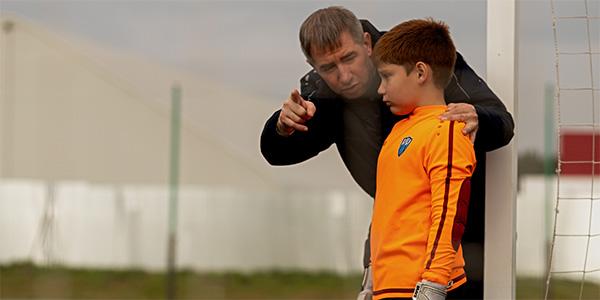
No Matter how Hard we Try, We Will Never be Perfect
And either will our children, especially when it comes to sports. In fact, we don’t want them to be perfect. If they don’t make mistakes, they’re not being challenged and aren’t learning and growing.
From t-ball to the tennis court, mistakes are a natural part of competitive sports. Whether your kids drop the game-winning pass, double-fault their serve at match point or miss par on the final hole, mistakes will happen. As parents, we can’t prevent our kids from making mistakes, but we can teach them how to deal with their disappointments, and move on from them. Here are five tips for helping your young athletes deal with disappointment after making mistakes or losing:
- Winning is not everything, contrary to popular belief. Bruce Kracke, coach, sports dad and certified trainer with the Positive Coaching Alliance, advises coaches and parents to create an environment that is conducive to learning, not one that promotes fear and intimidation. “Kids have an opportunity to learn in a safe environment provided you have the proper culture in place,” Kracke says, adding that a negative win-at-all-cost culture causes kids to freeze up. “They become nervous and it narrows their mindset down to one that’s more of a fixed mindset instead of a growth one,” he says.
- “Flush it!”–Trust us, your athletes are going to know when they have made a mistake. Chances are they’ll look up at you in the bleachers with that “I can’t believe I just did that” look. Parents and coaches should make a flushing sign when this happens, encouraging kids to move on.. “When a player makes a mistake, they’ll immediately look at the coach and both of them will make a ‘flushing’ motion, meaning they’ve just flushed that mistake away,” Kracke said. That simple motion or gesture allows an athlete to recognize the mistake, flush it away, and focus on the next play
- Encourage confidence, not cockiness — nobody likes a ball hog, a know-it-all or a show off. Teach your kids the difference between being self-confident and self-absorbed. Self-confidence is an admirable trait, and one that will serve your athletes well when it’s time to bounce back after a mistake. Talk with your kids about their mistakes, and sympathize with their situation. Offer suggestions on how they could handle the situation the next time.
- Be your child’s biggest fan — No, we don’t want you to show up for every game with an air horn, carrying a banner that says “My child is number One!” But we do want you to show up. Be available for your child, and be there when they hit that home run, or when they come in last place in the 400m freestyle. In either instance, your kids will know that they have a strong support system in sports, and in life. If kids make big errors in a game, or their team just lost the state championship, expect a few slammed doors and dirty looks. It’s a natural reaction to losing. Don’t take it to heart and wait it out before talking with them about their performance. Remind them of everything they did right. You might also encourage them to talk about what they learned from their mistake or loss–or what they could learn by trying something different next time.
- Encourage kids to be “doers” — John Wooden, one of the winningest college basketball coaches of all time, said many times that the team that makes the most mistakes will win most often. Sound odd? Not really. Players who make mistakes are the ones taking risks. At times, those risks don’t pay off, but many times they do. Encourage your child to be a doer and a risk-taker. Mike Ditka once said, “success isn’t permanent and failure isn’t fatal.” Teach your kids to step out of their comfort zones, take risks, and be the best they can be. They will fail at times. Let them. The mistakes they make now will serve as a foundation for learning, growth and positive behaviors for the rest of their lives.
Related Sports Psychology Articles
- Helping Young Athletes Let Go of Mistakes
- Helping Sports Kids Let Go of Mistakes
- Dealing with Outbursts in Youth Sports
*Subscribe to The Ultimate Sports Parent Podcast
*Subscribe to Peak Performance Sports on Youtube
Download a free sports psychology report to improve your mental game!
Sports Psychology Coaching for Young Athletes

One-on-one mental performance coaching is the fastest and most effective method to improve your athletes’ mental game, boost their performance, and make lasting changes. And as a bonus, parents learn what to say to help young athletes feel confident and thrive in sports. Please call us at 888-742-7225 with your questions.
